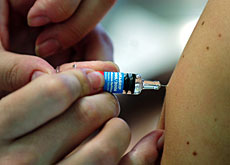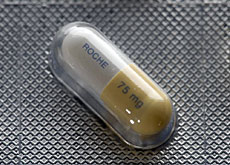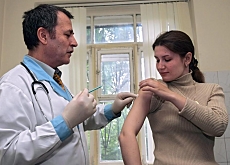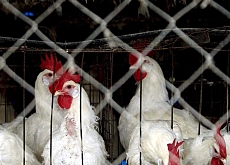Swiss spell out pandemic vaccination plan

The Swiss authorities have given further details of plans to vaccinate the entire population in the event of an influenza pandemic.
In October Switzerland became the first country to confirm it would stock a pre-pandemic vaccine against the human form of bird flu, which has so far killed more than 150 people worldwide.
Presenting an updated version of the country’s pandemic plan on Tuesday, Thomas Zeltner, head of the Federal Health Office, said the continued spread of the deadly H5N1 bird flu virus meant there remained a “real threat” of a flu pandemic.
He stressed that the authorities were doing everything possible to mitigate the effects of an outbreak. “We are better prepared that ever before, but we are not in the clear,” he said in Geneva.
Zeltner highlighted the stockpiling of two million doses of the antiviral drug Tamiflu and the recent SFr180 million ($150 million) order for pre-pandemic and pandemic vaccines. On Tuesday the House of Representatives approved a SFr75 million credit towards buying vaccines.
Eight million doses of the pre-pandemic vaccine manufactured by Anglo-American firm GlaxoSmithKline are due to be delivered to the army’s pharmacy division early next year.
Pandemic outbreak
Claire-Anne Siegrist, head of the Federal Vaccination Commission, said the drug represented a “new weapon” in the arsenal against a pandemic outbreak.
According to the Geneva University Hospital professor, tests show that the pre-pandemic vaccine triggers a successful immune response against different H5N1 strains and leaves an imprint on the body’s immune system that can be reactivated by further vaccine doses.
She added that clinical trials on thousands of patients had produced no serious secondary effects.
“The likelihood is very high that we will be without a vaccine for the first wave of a pandemic,” she told swissinfo. “We will definitely find a vaccine, but it could take four to six months to have sufficient numbers of doses to give to the population.”
“This is why having a primed immune response with a pre-pandemic [vaccine] is so important. It’s a very smart move.”
Vaccination programme
Siegrist said one of the biggest challenges would be deciding when to begin a pre-pandemic vaccination programme and to identify target groups.
Pierre-Alain Raeber of the health office’s infectious diseases department said the government was also looking into the idea of an antiviral back-up for Tamiflu, which is made by Basel-based Roche.
Earlier this month a report by the Royal Society and the Academy of Medical Sciences in Britain said the H5N1 avian virus might develop resistance to Tamiflu.
To overcome any potential problems, scientists recommended that the government should also stockpile GlaxoSmithKline’s antiviral drug Relenza.
Raeber said it was likely that over time the virus would develop resistance to Tamiflu and this was why the health office was examining the possibility of stockpiling a second antiviral drug.
Last week Roche issued a statement hitting back at what it described as “erroneous speculation” that resistance to Tamiflu was increasing. The pharmaceutical giant said there was no scientific evidence to suggest this was happening.
swissinfo, Adam Beaumont in Geneva
According to the latest WHO update, there have been 258 human cases of bird flu in ten countries since 2003, with 154 deaths.
Most fatalities have occurred when humans have been in close contact with infected poultry.
Health experts fear the H5N1 virus will eventually mutate into a form easily transmissible among humans.
No cases of the human form of bird flu have been reported in Switzerland.
The government’s 2006 flu pandemic plan, finalised in August, proposes detailed guidelines, plans and responses in the event of an outbreak.
Experts say that although cross-infection of the H5N1 virus to humans is rare, there have been more than 150 deaths from the illness in humans, mainly in Asia.
Switzerland remains on a high state of alert. In October farmers were ordered to lock up poultry kept within one kilometre of major Swiss lakes and rivers until April 30.
On Tuesday Kagfreiland, a farm animal protection organisation, called for restrictions to be lifted on December 15, claiming the risk of bird flu had diminished.

In compliance with the JTI standards
More: SWI swissinfo.ch certified by the Journalism Trust Initiative



You can find an overview of ongoing debates with our journalists here. Please join us!
If you want to start a conversation about a topic raised in this article or want to report factual errors, email us at english@swissinfo.ch.